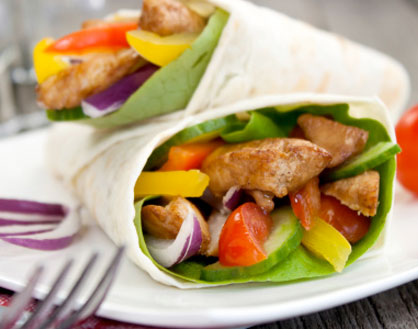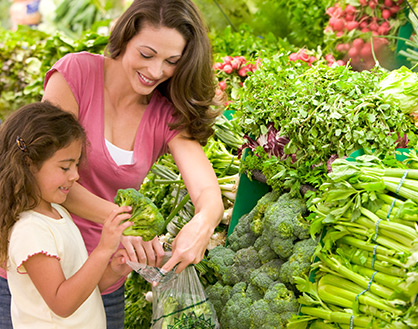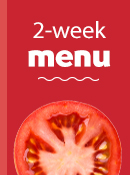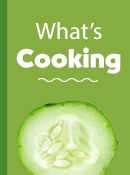Cooking can be easier than you think! On this page, we’ll provide some basics to help you get started.
First, here are some basic definitions for common cooking terms. They’ll come in handy when you’re making a recipe.
| Cooking Terms | |
| Bake/Roast | Cook food uncovered in an oven or similar appliance. |
| Beat | Make mixture smooth with rapid, regular motion using a wire whisk, spoon, hand beater or mixer. When using a spoon, lift the mixture up and over with each stroke. |
| Blend | Mix two or more ingredients thoroughly. |
| Boil | Heat a liquid until bubbles break on the surface or cook in boiling water. |
| Braise | Slowly cook meat or poultry in a small amount of liquid in a covered pot. |
| Broil | Use direct heat to cook. |
| Brown | Cook quickly until surface of food is brown. |
| Chop | Cut food into small pieces. |
| Coat | Cover entire surface with a mixture such as flour or breadcrumbs. |
| Core | Using a sharp knife, remove the core and seeds of fruit. |
| Cream | Stir one or more foods until they are soft. |
| Crisp-tender | The “doneness” of vegetables when they are cooked only until tender and remain slightly crisp in texture. |
| Crush | Use a garlic press or a blunt object to smash foods such as garlic until the fibers separate. |
| Cube | Cut food into small, 1⁄2-inch cubes. |
| Dash | Less than 1/8 teaspoon. |
| Dice | Cut into small, square-shaped pieces. |
| Drain | Put food and liquid into a strainer or colander, or pour liquid out of a pot by keeping the lid slightly away from the edge of the pan and pouring away from you. |
| Flute | Pinch the edges of dough such as on pie crust. |
| Fold | Mix by turning over and over. |
| Fork-tender | The “doneness” of a food when a fork can easily penetrate the food. |
| Fry | Pan Fry – Cook in frying pan over medium heat with small amount of oil.
Deep Fry – Cook in hot oil deep enough for food to float. |
| Grate | Rub food on a grater, or chop in blender or food processor to produce fine, medium or coarse particles. |
| Grease | Cover or lubricate with oil to keep food from sticking. |
| Knead | Work dough by folding and stretching with heel of hand. |
| Marinate | Allow food to soak in liquid to increase flavor and tenderness. |
| Mince | Cut or chop food into small pieces. |
| Mix | Combine ingredients using a fork or spoon. |
| Oil | Apply a thin layer of vegetable oil on a dish or pan. Can substitute vegetable oil spray. |
| Peel | Remove outer covering of foods by trimming away with a knife or vegetable peeler. |
| Preheat | Heat oven to desired temperature before putting food in to bake. |
| Poach | Cook food over low heat in a small amount of hot, simmering liquid. |
| Sauté | Cook in a small amount of oil or water. |
| Scald | Heat milk until bubbles appear. Bubbles should not be “breaking” on the surface. |
| Shred | Rub foods against a grater to divide into small pieces. |
| Sift | Remove lumps or lighten the dry ingredients by putting them through a strainer or a sifter. |
| Simmer | Cook at a temperature just below the boiling point. Bubbles form slowly but do not reach the surface. |
| Slice | Cut food into thin pieces. |
| Steam | Cook over boiling water. |
| Stew | Cook food over low heat in a large amount of simmering liquid. |
| Stir-fry | Quickly frying vegetables to a crisp-tender state while constantly stirring. |
| Stock | Water in which vegetables or meat has been cooked. Should be stored in the refrigerator. |
| Thaw | Slowly change from a frozen state to a liquid state. |
| Toss | Mix foods lightly with a lifting motion, using forks or spoons. |
Measurement Conversions
Use this handy chart for different ways to measure ingredients. For instance, sometimes, it might be more helpful to use a measuring cup instead of a measuring spoon. Take a look and see for yourself—knowing this can help make your work in the kitchen even easier!
| Measurements |
| 1 tablespoon = 3 teaspoons |
| ¼ cup = 4 tablespoons |
|
1/3 cup = 5 1/3 tablespoons
|
|
½ cup = 8 tablespoons
|
|
2/3 cup = 10 2/3 tablespoons
|
|
3/4 cup = 12 tablespoons
|
|
1 cup = 16 tablespoons
|
|
1 pound = 16 ounces
|
|
1 fluid ounce = 2 tablespoons
|
|
8 fluid ounces = 1 cup
|
|
½ pint = 1 cup
|
|
1 pint = 2 cups
|
|
1 quart = 4 cups
|
|
½ gallon = 2 quarts
|
|
1 gallon = 4 quarts
|
|
16 ounces = 1 pint
|
|
32 ounces = 1 quart
|
|
34 ounces = 1 liter
|
|
68 ounces = 2 liter
|
|
128 ounces = 1 gallon
|









